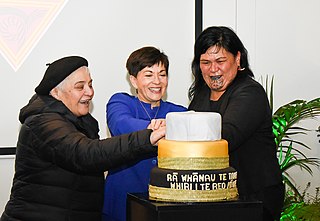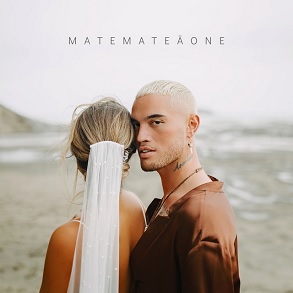Related Research Articles

The Cook Islands is an island country in Polynesia, part of Oceania in the South Pacific Ocean. It consists of 15 islands whose total land area is approximately 236.7 square kilometres (91 sq mi). The Cook Islands' Exclusive Economic Zone (EEZ) covers 1,960,027 square kilometres (756,771 sq mi) of ocean. Avarua is its capital.

Te Wiki o te Reo Māori is a government-sponsored initiative intended to encourage New Zealanders to promote the use of the Māori language which is an official language of the country. Māori Language Week is part of a broader movement to revive the Māori language. It has been celebrated since 1975 and is currently spearheaded by Te Puni Kōkiri and the Māori Language Commission, with many organisations including schools, libraries, and government departments participating.
Traditional Māori music, or pūoro Māori, is composed or performed by Māori, the indigenous people of New Zealand, and includes a wide variety of folk music styles, often integrated with poetry and dance.
Cook Islands Māori is an Eastern Polynesian language that is the official language of the Cook Islands. Cook Islands Māori is closely related to New Zealand Māori, but is a distinct language in its own right. Cook Islands Māori is simply called Māori when there is no need to disambiguate it from New Zealand Māori, but it is also known as Māori Kūki ʻĀirani or, controversially, Rarotongan. Many Cook Islanders also call it Te reo Ipukarea, literally "the language of the Ancestral Homeland".
Ramon Te Wake is a New Zealand trans woman documentarian, singer-songwriter and television presenter. Her first presenting job was for Māori Television, where she was one of three people fronting Takatāpui, which is Maori Television's first ever LGBT show.
Tākitimu was a waka (canoe) with whakapapa throughout the Pacific particularly with Samoa, the Cook Islands, and New Zealand in ancient times. In several Māori traditions, the Tākitimu was one of the great Māori migration ships that brought Polynesian migrants to New Zealand from Hawaiki. The canoe was said to be captained by Tamatea.

"Te Atua Mou Ē" is the national anthem of the Cook Islands. It was adopted in 1982, replacing the previous New Zealand anthem "God Defend New Zealand".
Rakahanga-Manihiki is a Tahitic language belonging to the Polynesian language family, spoken by about 2500 people on Rakahanga and Manihiki Islands and another 2500 in other countries, mostly New Zealand and Australia. Wurm and Hattori consider Rakahanga-Manihiki as a distinct language with "limited intelligibility with Rarotongan". According to the New Zealand Maori anthropologist Te Rangi Hīroa who spent a few days on Rakahanga in the years 1920, "the language is a pleasing dialect and has closer affinities with [New Zealand] Maori than with the dialects of Tongareva, Tahiti, and the Cook Islands"

"Poi E" is a song by New Zealand group Pātea Māori Club off the album of the same name. Released in 1983, the song was sung entirely in the Māori language and featured a blend of Māori cultural practices in the song and accompanying music video, including Māori chanting, poi dancing, and the wearing of traditional Māori kākahu (garments). The song reached No. 1 in New Zealand in each of the following three decades.
Te Kumeroa "Ngoingoi" Pēwhairangi was a prominent teacher of, and advocate for, Māori language and culture, and the composer of many songs, including Poi E. She spearheaded the Māori Renaissance in the late 1970s and early 1980s.
Dame Kāterina Te Heikōkō Mataira was a New Zealand Māori language proponent, educator, intellectual, artist and writer. Her efforts to revive and revitalise the Māori language led to the growth of Kura Kaupapa Māori in New Zealand.

Boiler Room is an online music broadcaster and club promoter based in London, United Kingdom. It hosts predominantly dance music events, focusing on underground genres, in locations internationally, and broadcasts the shows live over the internet.

Te Whakaruruhau o Ngā Reo Irirangi Māori is a New Zealand radio network consisting of radio stations that serve the country's indigenous Māori population. Most stations receive contestable government funding from Te Māngai Pāho, the Māori Broadcast Funding Agency, to operate on behalf of affiliated iwi (tribes) or hapū (sub-tribes). Under their funding agreement, the stations must produce programmes in the Māori language, and must actively promote Māori culture.
Te Patukirikiri is a Māori iwi of the Hauraki area of New Zealand.

Debbie Anne Ngarewa-Packer is a New Zealand politician, iwi leader and activist. She is a Member of Parliament and co-leader of Te Pāti Māori alongside Rawiri Waititi, and is the chief executive of the Ngāti Ruanui iwi.
Mere Tepaeru Tereora is a Cook Islands artist and educator. Her Tivaevae work is internationally recognised and displayed in the Museum of New Zealand Te Papa Tongarewa. She is also a significant figure in the revival of Cook Islands Māori, establishing language nests for it in New Zealand. She was the sister of writer Kauraka Kauraka.
Donna Campbell is a New Zealand Māori university teacher, curator, weaver and textile artist. She affiliates with Ngāpuhi and Ngāti Ruanui iwi. Her works are held in the Museum of New Zealand Te Papa Tongarewa and in the British Museum. In 2019 Campbell completed a PhD at the University of Waikato with a thesis titled Ngā kura a Hineteiwaiwa: The embodiment of Mana Wahine in Māori fibre Arts.

Maisey Rika is a New Zealand singer, songwriter and composer, performing in both English and Māori. Her five original albums have each reached the Top 40 in the Official New Zealand Music Chart. She was named an Arts Foundation Laureate in 2021, has received awards at the Waiata Māori Music Awards and APRA Awards, including APRA Best Māori Songwriter in 2010 and 2013, and has twice won Best Māori Language Album at the NZ Music Awards.

"Matemateāone" is a song by New Zealand musician Stan Walker. A bilingual ballad sung primarily in Māori language, the song was released as a single a week before Walker's first album sung in Māori, Te Arohanui. A love ballad, the song's music video celebrates his marriage to his partner Lou Tyson.
Raukura Maria Turei is a New Zealand artist, actor and architect. She works with Māori iwi to design community-focused developments at the architectural practice Monk Mackenzie Architects. Her paintings have been exhibited throughout New Zealand, and she appeared in the New Zealand film The Dead Lands.
References
- 1 2 Gupwell, Seth (21 April 2023). "London-based Māori DJ Lady Shaka aims to 're-indigenise club culture' by honoring Māori artists". George FM. Retrieved 25 February 2024.
- ↑ "MULTI-NESIANS: Lady Shaka". The Coconut.tv. 2022. Retrieved 25 February 2024.
- 1 2 Tugaga-Rogers, Breanna (2 November 2022). "Lady Shaka taking Pacific culture global". TP+. Retrieved 25 February 2024.
- ↑ Cafolla, Anna (30 May 2022). "Recognise: Lady Shaka". DJ Mag.
- ↑ "Lady Shaka | Boiler Room: Melbourne". YouTube. 2023. Retrieved 25 February 2024.
- ↑ "Lady Shaka | Boiler Room Festival Berlin: SYSTEM". YouTube. 2024. Retrieved 25 February 2024.
- ↑ "FILTH". boilerroom.tv. 3 April 2021. Retrieved 25 February 2024.
- ↑ Gupwell, Seth (4 July 2023). "Māori DJ Lady Shaka drops iconic Te Reo tune, stuns with poi performance for Matariki in London". Mai FM. Retrieved 25 February 2024.
- ↑ "'We deserve to have our voices amplified': Lady Shaka on the first-ever Boiler Room set in the Cook Islands". ABC. 24 January 2024. Retrieved 25 February 2024.
- ↑ Luke, Candice (17 January 2024). "Global beats land in Rarotonga". Cook Island News. Retrieved 25 February 2024.
- ↑ Gupwell, Seth (23 February 2024). "LISTEN: Lady Shaka just dropped her debut single 'E Tu' and it is a thumper with a message". George FM. Retrieved 5 March 2024.
- ↑ "Lady Shaka wins the Arts, Culture and Creativity Award at Pacific Music Awards". Creative NZ. 11 August 2023. Retrieved 5 March 2024.